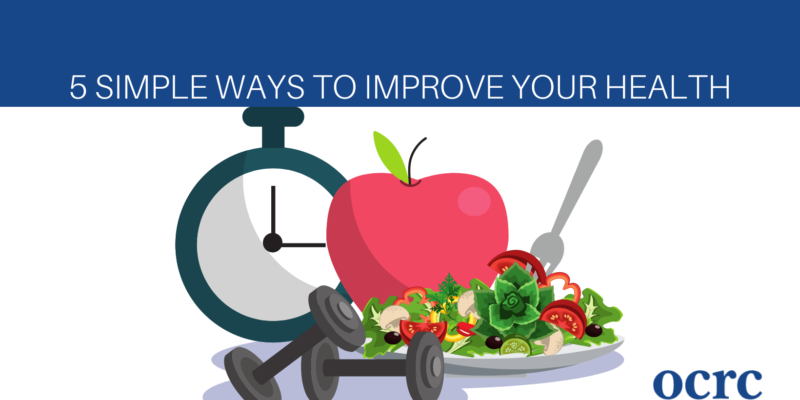
Many people consider the start of a new year to be a good time to get a fresh start and make some positive changes—just check out how full your local gym is during the beginning of January compared to later in the year. Unfortunately, many of these eager gym-goers either fail to set realistic goals or lose focus and accountability.
Instead of setting a New Year’s resolution this year, consider working toward a tangible, measurable goal. If you resolve to lose weight, for example, make a plan as to how you will make this happen and you might fall into the 8 percent of people don’t give up on their New Year’s resolution.
Three of the top 10 New Year’s resolutions include improving health (dieting/eating healthier, exercising more, and losing weight). If you also want to set goals for staying healthy in the new year, read on for five tips on how to improve your health.
With our busy schedules, it can be hard to find time to exercise when your day consists of sitting in a car, sitting for eight hours at work, and then sitting at the dinner table and then in front of the TV when you get home. Exercise can be simple, though—even a quick walk for 30 minutes a day can significantly decrease the risk of heart disease and diabetes while getting the blood flowing and letting your mind relax for a bit.
Losing weight isn’t a matter of diving into an intense workout routine and a strict diet. In fact, dieting can often have more negative effects than positive. Instead of significantly changing your lifestyle in the hopes of losing significant weight, consider taking smaller steps to first maintain your current weight by eating more whole foods and exercising more frequently, and then gradually lose weight. If the weight loss is due to a healthier overall lifestyle, you’re much more likely to keep off the weight.
One simple way to maintain and lose weight is to substitute water (four to six glasses per day) for sugary drinks and excessive alcohol. Your skin, joints and muscles, and organs will thank you; staying hydrated will keep your blood vessels open which allows for blood to travel freely throughout the body.
…smoking, that is. Not only does smoking cause lung damage, it also can cause hardening of the arteries and even kidneys. Of course, if you’re a regular smoker, quitting can seem like a daunting task. Instead of making one generalized resolution to quit smoking, consider setting several smaller goals (such as setting alternate strategies for managing stress, or talking to a doctor about medication that will help) which will give you a more solid foundation to help you follow through.
Sleep deprivation affects both your physical and mental health. Our bodies need at least seven to eight hours of sleep (more than that can actually be harmful) during which our brains and bodies are working hard to maintain immune systems, memory strength, and even hunger levels. Some simple steps to getting enough sleep include setting a regular sleep-wake schedule, limiting caffeine, relieving stress and getting enough physical activity, which will help to promote deeper, restful sleep.
If your new year doesn’t start on a healthy path, keep in mind that it’s never too late to get a fresh start and make some positive changes—even if it’s the middle of the year.
